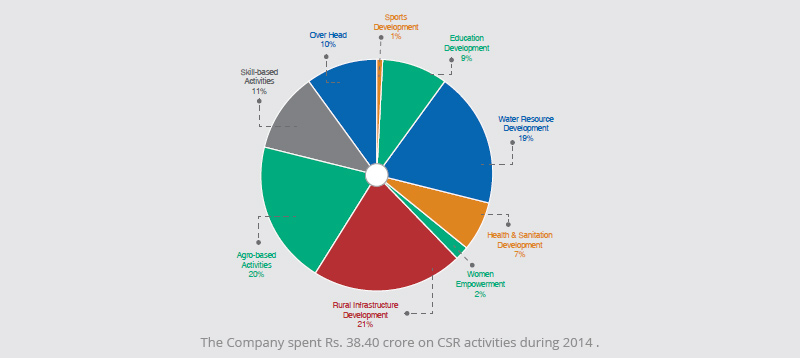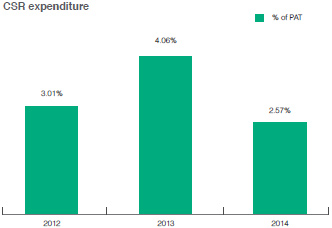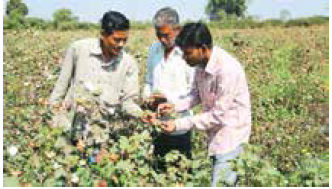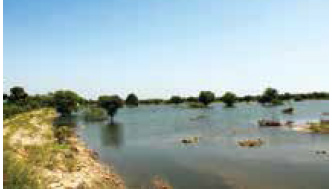

 |
 |
 |
 |
 |
 |
 |
 |
 |
 |
 |
 |
 |
 |
 |
 |
 |
 |
 |
 |
 |
| Empowering Communities |
| At Ambuja, the corporate social responsibility (CSR) has been an integral part of the business since our inception. The founders of the Company always believed that it was imperative for the surrounding communities and stakeholders to progress with the Company. This vision resulted in the establishment of the Ambuja Cement Foundation (ACF) in 1993. ACF is the CSR arm of the Company. ACF operates in 12 states and 22 locations (including all our operating locations), reaching out to more than 14 lakh people in over 860 villages. ACF programmes are in line with its mission statement -‘Energise, involve and enable communities to realise their potential’. Stakeholder Engagement is the key to implement CSR programmes; several tools and processes have been | established to aid this objective. To integrate business and community needs, community engagement plans (CEPs) are prepared in close consultation with the community and then the unit. A community advisory panel (CAP), which is an advisory body, representing community leaders, the local administration, NGOs, and the Company, has been formed at each location. This is a platform for exchange of information and views, hearing out community concerns, and deciding about future programmes. The social engagement scorecard (SES) tool rates the initiatives of the Company across locations. The methodology used is to collect information and reviews the work done through detailed group discussions and interviews. In 2014, all our locations scored in the range of 75% to 100%, indicating positive reviews. |
 |
before introducing any programme in the community.
This ensures complete community participation from the
planning to the implementation stage. Environment impact
assessments (EIAs) are undertaken for any new or
expansion projects at our plants and mines according to
guidelines specified by the Government. Public disclosure
of EIA reports and public consultation are essential
elements of this process. ACF has also developed a
detailed monitoring system to monitor inputs and outputs.
The work is regularly subjected to evaluation and impact
assessment. As projects evolve, evaluation studies, both
internal and external, are undertaken to review direction and
make course corrections as required. On maturity or
completion of the projects, impact assessments are done
by reputed external parties. Through these assessments
we have seen very positive outcomes and benefits for the
people of our areas.
As a result of this robust and impactful approach,
substantial funding is received from the Government and
other funders who view ACF as an implementing organisation
for developmental programmes. With this funding, ACF has
expanded to regions beyond Ambuja plants. Water Resource Management Every plant strives to give back more water than it utilises. This is achieved through community based water projects that have at least one of the following objectives:

programmes like organic farming in the north and SRI in the east have enhanced agricultural practices. ACF promotes Better Cotton Initiative (BCI), a global initiative for sustainable cotton production. The implementation of BCI practices has promoted work ethics on farms, ensured soil health coupled with safe environment practices and generated better profit margins. About 70,565 MT of cotton, all licensed as ‘Better Cotton’ were produced by our farmers in 2014, as compared to 29,894 MT in 2012 covering 17,213 farmers (up from 7,116 in 2012). Almost all farmers qualified their produce as ‘Better Cotton’ (up from 92% in 2012). Animal husbandry is an essential alternate income source for many rural families. ACF’s animal husbandry programme aims to ensure good health of the cattle belonging to the community. Regular cattle health camps coupled with training for farmers on the importance of green fodder and animal feed are organised. In Darlaghat, ACF has trained para-vets known as pashu swasthya sevikas (PSS). The PSS are village women trained by ACF to ensure animal care in their villages. Skill Training ACF imparts skill training through its 16 Skill & Entrepreneurship Development Institutes (SEDIs) established across locations. SEDIs have changed the social & economic dynamics of villages by creating assured jobs for skilled youth and addressing industry’s demand for skilled personnel. Till December 2014, SEDIs have trained 19,908 youth with a placement rate of 76%. In Kodinar, young girls who have undergone bed side attendant training are now allowed to work in nearby towns. This is a big change from the days when they were not allowed to be trained at all. Today, |
These processes ensure that the
programmes introduced are relevant and dynamic. Based
on an assessment of the needs and priorities of the host
communities, ACF works in identified thrust areas such as
water resource management, livelihood generation
(agro-based & skill-based), and socio-economic
development including health, education, and women’s
empowerment. All the programmes are designed,
developed, and implemented with the direct
participation of the community. ACF projects are in
complete alignment with the requirement of the region,
involving the people at every stage. We believe that
involvement of people coupled with hand-holding
support leads to progressive programmes that are
sustainable. ACF’s programmes are owned by the
people. The nuances of the projects differ according to
the varied geographies. ACF also partners with numerous
other organisations who share the dream of working with
communities for a better future. The Foundation has a well
developed process to initiate, plan, and implement
programmes and conducts participatory rural appraisals The programme was initiated in the salinity ingress areas of Kodinar, and has now spread to the dry arid regions of Rajasthan, and the hilly regions of Darlaghat. Since every location has a unique topography, strategies & programmes are moulded to suit the needs of the region and the  communities within it. ACF has been waging a tough battle against salinity in Gujarat through methods like RRWHS, construction of check dams and pond recharge. In Rajasthan, ACF revived traditional water conservation systems like khadins. This, coupled with technical advances, has ensured the availability of good quality water for household & agricultural purposes. In Himachal Pradesh, watershed management is used as a means of water conservation and livelihood. Creation of community institutions like water user associations (WUAs) and pani samitis are a part of the planning and execution of water projects. They also ensure post project repair and maintenance of the assets created. Our water resource management work has created a ripple effect in the lives of the people. The availability of water in the households has vastly improved the quality of life, especially of the women and children who would spend most of their time procuring water for their homes and fields. Collaboration with various state governments, local NGOs, and academic institutions to implement state specific water conservation programmes has also ensured the success of the programme. Agro Based Livelihood In Kodinar and Rajasthan, availability of clean and usable water has enabled farmers to grow more than one crop in their fields, directly impacting livelihoods. The use of drip and sprinkler irrigation instead of flood irrigation has ensured optimum utilisation of water in the fields. The farmers benefit from numerous training programmes conducted by ACF across locations. The ACF-managed Krishi Vigyan Kendra (KVK) at Ambujanagar, is a one stop shop for the latest and best agricultural technologies in the region. these girls contribute to their family income after completing the training course. In Chandrapur, unemployed youth find jobs in industries or take up construction assignments in nearby villages after completing their mason training course. In 2014, SEDI also provided supplementary skill training to Ambuja workers along with valid certification. SEDI provides training in 45 different trades and complements these skills by providing training in computerrelated work, English & soft skills. A number of the courses at SEDI are Government-affiliated. Comprehensive Health Care and Sanitation ACF works extensively in its neighbouring communities to promote comprehensive healthcare. Our initial activities addressed the immediate clinical needs of the people through curative care. Gradually, the programme developed to prevent diseases and promote health.The clinical services include mobile medicare units (MMUs), specialised health camps, community health clinics, diagnostic centres, and primary health care services through trained community health volunteers called sakhis. A sakhi is a member of the village especially trained by ACF to address maternal and child health issues. Till date, ACF has trained 337 sakhis out of which 110 have been absorbed as ASHAs (Accredited Social Health Activists). Today, the sakhi is also an active participant in promoting sanitation, tobacco control, and adolescent issues. ACF is also District ASHA Resource Centre (DARC) for Haridwar district under the National Rural Health Mission (NRHM). In the year 2014, ACF initiated APEKSHA (Adolescent Peer for Enhancement of Skill and Healthy Association). APEKSHA reached out to 6,200 adolescents through its peer support system and discussed issues related to personality changes during adolescence, HIV/ AIDS, nutrition awareness, gender equality, safety (road, fire and household), first aid, self-defence, and stress management. Anaemia is prevalent in many areas especially amongst pregnant/lactating mothers and adolescent girls. Apart from regular sessions on a healthy and nutritious diet, and maintaining personal hygiene especially amongst women, ACF has promoted the intake of iron rich indigenous food. The anemia control programme reached out to 6,400 women. ACF has been working extensively to promote total sanitation in its communities much before it was declared as a national agenda. Through active participation of the VDC (Village Development Committee), communities promote sanitation as a campaign. ACF has been able to register 17 villages for the Nirmal Gram Puraskar, out of which 11 villages have received the award. ACF has facilitated construction of over 10,000 individual as well as |
 |
 |